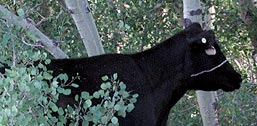|
paisley rekdalHere, for the first time (and in no specific order,) we present Professor Paisley's Crash Course in outdoor literature: 1. Mutiny on the Bounty by Charles Nordhoff. Read it in high school and was forever haunted by Bligh's navigational genius. He saved himself and half a dozen other men cast adrift in a damn rowboat on the open sea by simply navigating by the stars. Can I even read a basic street map? No. 2. Little House on the Prairie by Laura Ingalls Wilder. She got oranges for Christmas and was grateful. Grateful! That's how freaking tough her life was out there. 3. Addicted to Danger by Jim Wickwire. First-person account of scaling the world's tallest peaks and watching everyone the writer loves die. The book's prose sucks rocks, and the writer makes almost no attempt to explain his obsession with climbing, but I have to admit his story (and his monomania) was fascinating. 4. Sand County Almanac by Aldo Leopold. Anyone who looks at squirrels and Canadian geese with the reverence Leopold does deserves a read. Again, nature doesn't have to be vicious or terrifying or even that obscure to be a necessary force in our lives. 5. Refuge: An Unnatural History of Family and Place by Terry Tempest Williams. She does a great job of using the western landscape to examine the horrors of breast cancer. Send this one on to Bush. 6. Walden by Henry David Thoreu. Of course. Hated him in high school because, well, I was in high school. Now I'm not. 7. White Fang, "To Build a Fire," Call of the Wild by Jack London. Most of my suburban fear of nature is derived from Jack London stories. But he also shaped my attraction to nature as well, through his portraits of animals. Even now that's what inspires my longing for nature: animals, danger, stupid survival tricks and snow. Add convicts to the list and what you really have is Alaska, not Wyoming. Possibly I am in the wrong state. 8. Never Cry Wolf by Farley Mowat. Again, how I didn't end up in Alaska is beyond me. 9. Staying Found by June Fleming . A whole guide devoted to stupid survival tricks. 10. Anything about Annie Oakley. Read two or three biographies on her. Her story isn't so much about nature or survival but about being a woman in the "wild" west. Is this why I moved to Wyoming? 11. And Richard Burton. The consummate adventurer. I read two biographies, one which was terrible and one which was good, and sadly I can't remember which was which because they were both written by Englishmen and they both had Richard Burton: A Life in the title. One book tried to argue that Burton was a repressed homosexual married to a scheming, overbearing, and generally unattractive harridan who burned his papers after he died and never appreciated his genius for language and exploration. The second book treated him like a man. A really really smart man, but basically a man.
12. Into the Wild by Jon Krakauer. The one question that fascinated me most was the question of gender. Why do men become the risktakers in the environmental movement? Why is risk-taking even a part of the environmental culture? How are we making the wild a masculine place, through our literature, our films, our basic collective imagery? To be fair, that's not the book Krakauer set out to write. But it became the most intriguing one for me. Bonus material:
Contents Copyright 2001, National Public Radio |
||||||||


